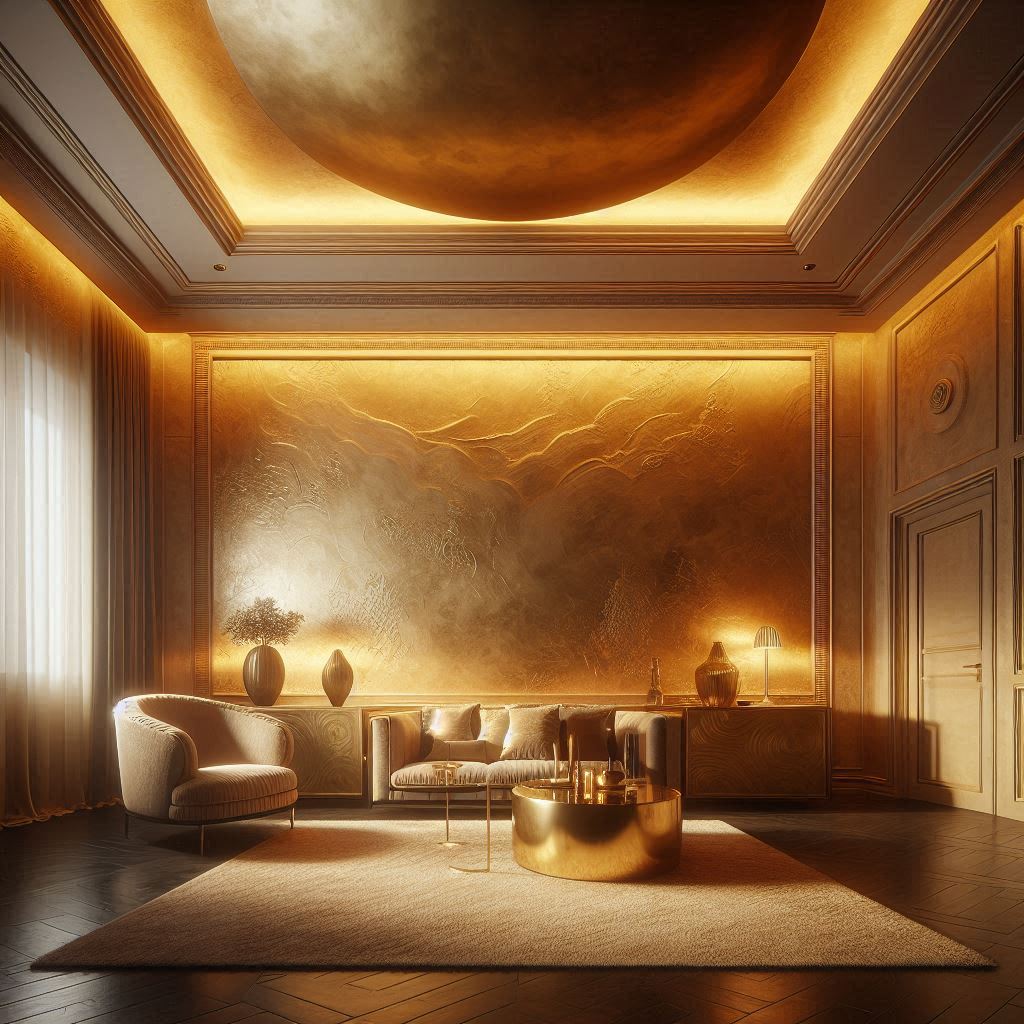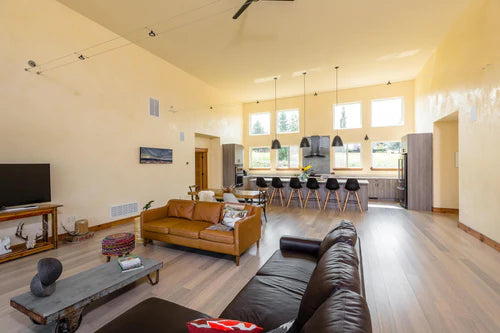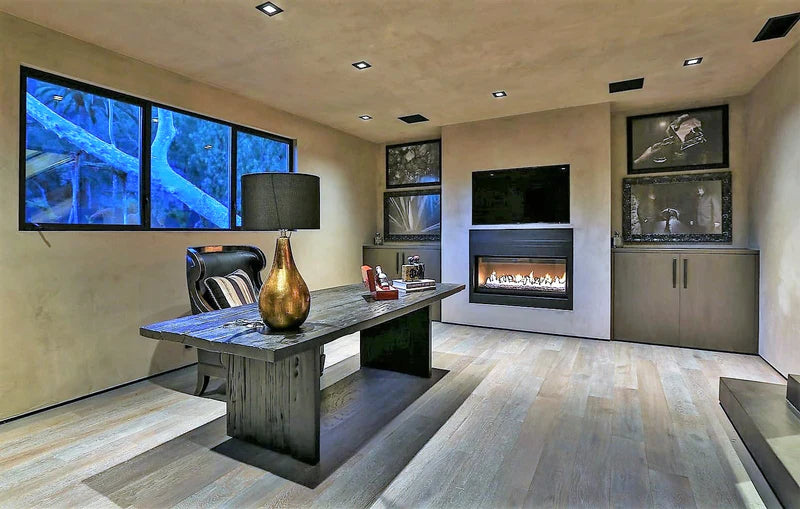Esthetic Venetian Plaster Finishes

Key Takeaways
- Venetian plaster combines ancient techniques with modern design sensibilities
- It offers versatility in application, suiting various interior styles
- The material is eco-friendly and durable, making it a sustainable choice
- Venetian plaster can mimic expensive materials like marble at a lower cost
- Professional application is recommended for the best results
- The finishes range from matte to high gloss, allowing for customization
Exploring the Aesthetic of Lime Based coatings and Venetian Plaster Finishes
Imagine turning your walls into art that lasts forever. Lime based coatings, often referred to as Venetian plaster finishes can do just that, mixing old-world beauty with today's style. This ancient craft, born in Rome and refined in the Italian Renaissance, is back in modern homes and offices. These coatings aren’t just plasters, but can also be lime paints or lime wash.
Lime based plaster and paints are more than just a pretty face. It's a celebration of skill and natural beauty. Using lime and marble dust, it adds texture and depth that fake materials can't. It fits well in many styles, from modern to rustic.
Today, Venetian plaster is more popular than ever. Designers and homeowners love how it changes a room. Whether it's a statement wall or a special panel, it brings luxury and personality to any space.

So, why is Venetian plaster so unique? It's not just about looks. It's eco-friendly, long-lasting, and flexible. It can look like marble or stone but costs less. And, it's safe for your health because it doesn't have harmful chemicals.
The Rich History of Venetian Plaster
Venetian lime plaster has a long history, dating back thousands of years. It started with ancient civilizations and has become a key part of luxury interiors today. This decorative art has shown its lasting beauty and flexibility over time.
Origins in Ancient RomeThe story of Venetian plaster begins in ancient Rome. Artisans there mixed lime and marble dust to make "stucco lustro," a shiny plaster finish. This early stucco veneziano was used to make walls and ceilings look like marble.
Renaissance Revival in Venice
In the Renaissance, Venice became a center for plaster art. Craftsmen there developed a technique of applying many layers of lime plaster. This made a shiny, marble-like finish. The technique became famous for its role in grand architecture during this time.
Modern Applications and Contemporary Appeal
Today, Venetian plaster is back in style in interior design. Its beauty, flexibility, and eco-friendliness make it a top choice for homes and businesses. Modern versions use natural ingredients, offering a green alternative to synthetic materials.
|
Era |
Key Development |
Application |
|
Ancient Rome |
Creation of "stucco lustro" |
Walls and ceilings |
|
Renaissance Venice |
Perfection of multi-layer technique |
Opulent architecture |
|
Contemporary |
Eco-friendly formulations |
Residential and commercial interiors |
Venetian plaster's lasting charm comes from its ability to add depth, texture, and visual appeal to spaces. As design trends change, this ancient technique still wins hearts with its timeless beauty and new uses.
Understanding Venetian Plaster Composition
Venetian plaster is known for its special mix and beautiful look. It's made with slaked lime putty and marble dust. This gives it a luxurious finish that's also good for the planet. It has fewer chemicals than other plasters, making it a better choice for inside your home.
Venetian plaster comes in different types. Veneziano plaster has a smooth, shiny surface and can be colored to match any decor. Carrera is another choice,made of powdered marble, limestone sand and natural resins. Marmorino is often made with a finer grain of limestone sands. It creates a smooth look perfect for modern spaces.
Applying Venetian plaster can be an artistic endevour, but can be quickly learned. It needs 2-3 coats and a lot of troweling. Venetian plaster is more durable than traditional plasters
- It's suitable for high-traffic commercial areas, interiors, exteriors and showers.
- Different grain sizes offer varied finishes in any color, texture or sheen.
But, Venetian plaster isn't great for places with a lot of moisture like kitchens and bathrooms. It's best for areas like living rooms, studies, and bedrooms. Here, its natural beauty can be enjoyed without worrying about moisture damage.
The Allure of Venetian Plaster Finishes
Venetian plaster turns plain walls into stunning works of art. It combines beauty with practicality, making it stand out from regular paint or wallpaper.
Timeless Elegance and Sophistication
Venetian plaster looks luxurious and refined. Its smooth finish can look like marble or stone, adding elegance to any room. The way light reflects off it creates a mesmerizing depth that catches the eye.
Versatility in Design Applications
Venetian plaster fits many design styles. It works on walls, ceilings, and even curved surfaces. This polished plaster can go from classic to modern, offering endless design options.
Depth and Texture in Interior Spaces
Venetian plaster adds depth and texture to rooms. Its multi-dimensional look brings character and warmth. Unlike flat paint, it offers a tactile experience that improves a room's feel.
|
Feature |
Venetian Plaster |
Traditional Paint |
|
Finish |
Smooth, glossy/matte |
Flat or semi-gloss |
|
Durability |
Highly durable, crack-resistant |
Less durable, prone to chipping |
|
Maintenance |
Minimal, easy-to-clean and repair |
Regular repainting needed |
|
Eco-friendliness |
Made from natural materials |
Often contains VOCs |
|
Visual depth |
Multi-dimensional effect |
Flat appearance |
The Allure of Venetian Plaster Finishes
Venetian plaster techniques offer many ways to make stunning wall finishes. These methods come from ancient Roman times and have changed over the years. Now, they give us the beautiful stucco veneziano we love. Artisans use layers of lime plaster to create depth and color variations that make walls look alive.
Craftsmen use special trowels to apply plaster in thin layers. This builds up texture and depth. It lets them control the look, from smooth to textured surfaces.
Burnishing is the last step in many Venetian plaster jobs. It involves polishing the surface with a tool or stone. This makes it look like natural marble. The polish can be light or very shiny, depending on what you like.
These Venetian plaster techniques offer endless design options. From classic to modern styles, artisans can mix different methods for unique wall treatments. This makes any interior space look special.
Color Options and Customization
Venetian plaster comes in many colors for your walls. You can pick from classic earth tones or bright colors. The Vasari Plaster Color Chart offers hundreds of standard color possibilities for your walls, as well as offering custom matches.
Traditional Earth Tones and Neutrals
Many people choose earth tones and neutrals for their walls. These colors make a room feel warm and welcoming. They work well with many styles and include beige, brown, grey, and white.
Bold and Vibrant Color Choices
If you want to stand out, Venetian plaster has bold colors. You can find vibrant oranges, greens, yellows, blues, and blacks. These colors add depth and make your space unique.
Creating Custom Hues for Unique Interiors
Venetian plaster is great for custom colors. With virtually infinite color options, you can find the perfect shade for your walls. Designers and homeowners can get exact colors for their walls.
Venetian Plaster Finishes: From Matte to HighGloss
Venetian plaster comes in many finishes, from soft matte to shiny high gloss. This lets homeowners pick finishes that match their style. The right finish can change how a room feels, so it's important to know your options.
Matte finishes give a sleek, simple look. They soak up light for a soft, smooth feel that's great for a cozy and calming atmosphere. High gloss finishes bounce light off the walls, making them look bigger and more elegant.
Vasari Lime Plaster and Paint is a top-notch Venetian plaster manufacturer known for its authentic formulas, design versatility, ease of use and endless variety of colors, textures and sheens.
You can change the sheen of Venetian plaster by burnishing and polishing it. This lets you tailor the look to fit your decor and the room's lighting. Whether you want a calm, natural look or something bold and shiny, Venetian plaster can do it.
"Venetian plaster finishes offer unparalleled versatility, allowing us to transform walls into works of art that complement any interior design vision."
Venetian plaster finishes range from matte to high gloss, offering a luxury look at a lower cost. They can look like expensive stones like marble or limestone. This makes them a favorite for adding elegance without breaking the bank.
Venetian Plaster Finishes: From Matte to HighGloss
Venetian plaster is a top pick for eco-friendly wall coatings. It's made from lime and marble, offering a sustainable option over traditional paint. This choice combines beauty with caring for the planet.
Creating Custom Hues for Unique Interiors
Venetian plaster uses natural minerals like slaked lime, crushed limestone and marble dust. This mix means no harmful VOCs. It's safe to use and helps keep the air inside clean.
Carbon Dioxide Absorption Properties
Lime-based plaster can soak up carbon dioxide as it dries. This process helps it set and clean the air you breathe. It keeps taking in CO2 over time, making your home greener.
Longevity and Reduced Need for Replacement
Venetian plaster lasts a long time with the right care. It can go decades without needing a new coat, cutting down on waste. It fights mold and bacteria too, making it a smart pick for many places.
|
Feature |
Benefit |
|
Natural Ingredients |
Non-toxic, safe for inhabitants |
|
Low VOC Content |
Improved indoor air quality |
|
CO2 Absorption |
Ongoing air purification |
|
Durability |
Reduced waste and replacement needs |
Venetian plaster is great for green building and eco-aware homeowners. Its natural make-up, clean air benefits, and long life make for a healthier home and less harm to the planet.
Conclusion: Elevating Interiors with Venetian Plaster Finishes
Venetian plaster finishes have been loved for years. They bring beauty, versatility and longevity to homes and designs. These finishes come from ancient Roman techniques and have become a key part of modern decor.
What makes Venetian plaster special is its mix of looks and endless variety. It's made from natural materials like slaked lime and marble dust. This makes it good for the air inside your home by taking in carbon dioxide. It's also strong, easy to keep clean, and fights mold and mildew, perfect for high humidity areas.
Venetian plaster can look like expensive marble or come in many colors. It's popular in homes and businesses for its lasting beauty and organic quality. Getting it right sometimes needs patient hands, but it's worth it. It raises the value of your property, needs little care, and keeps looking great, turning walls into stunning works of art.
FAQ
What is Venetian plaster?
Venetian plaster can also be synonymous with lime plaster and even lime paint/ lime wash. It is a historic formula that mixes lime and marble dust. It creates walls that look beautiful and last long. This technique started in ancient Rome and became popular in Venice during the Renaissance. In fact, versions of lime plasters and paints have been used throughout history around the world.
What are the benefits of using Venetian plaster?
Venetian plaster brings timeless beauty and versatility to walls. It's also eco-friendly and fights mold and mildew. This makes it a top pick for many design styles.
What are the different types of Venetian plaster?
There are several types, like Marmorino for a smooth and slightly textured look. Mastercoat, for a full bodied texture finish made with heavy limestone aggregates. Veneziano, a high polish mirror like finish and that can also be applied in a more subtle unburnished manner. Lime paint is basically a more liquified plaster can be applied with a brush.
How is Venetian plaster applied?
Applying Venetian plaster means layering lime plaster with tools like trowels and brushes. Techniques like troweling and burnishing give walls unique textures and finishes.
What color options are available for Venetian plaster?
You can choose from many colors, including earth tones and bright colors. You can even get custom colors to match your design.
What are the different finishes available for Venetian plaster?
Finishes range from matte to shiny. The sheen can be changed with burnishing and polishing.
Is Venetian plaster an eco-friendly option?
Yes, it's good for the planet because it's made from natural minerals and has low VOCs. It also lasts a long time, which means less waste.



